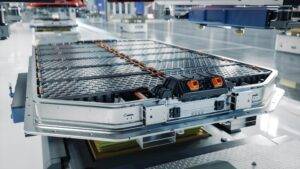
A significant technological breakthrough in electric car batteries could ease the range anxiety that has hindered the wider adoption of electric vehicles (EVs).
TDK, a company historically known for its cassette tapes, has developed a solid-state battery with an energy density 100 times that of its previous models.
Initially, TDK plans to produce these batteries for smaller devices such as earphones, hearing aids, and smartwatches. However, the potential for scaling up this technology to power electric vehicles is considerable. The new solid-state batteries promise higher output, significantly extending the driving range before needing a recharge.
Current lithium-ion batteries in most EVs offer a range of up to 500km (approximately 310 miles). In contrast, TDK’s new solid-state batteries could offer a range of up to 1,500km (930 miles), a substantial improvement that could alleviate one of the primary concerns for potential EV buyers—range anxiety.
This breakthrough was achieved using a proprietary ceramic material, giving the battery an energy density of 1,000 watt-hours per litre (wh/l), compared to the 700 wh/l of the best-performing lithium-ion batteries. Solid-state batteries also offer increased safety due to the absence of liquid electrolyte and shorter charging times.
Contribution to Energy Transformation
Noboru Saito, TDK’s CEO, stated, “We believe that our newly developed material for solid-state batteries can make a significant contribution to the energy transformation of society.” The batteries use oxide-based solid ceramic electrolyte and lithium alloy anodes. However, technical challenges remain, such as maintaining contact between the components and ensuring the battery functions under pressure.
Japanese carmakers have shown particular interest in solid-state batteries, with Toyota aiming to commercialise the technology by 2027, although this is later than initially estimated due to scaling challenges.
Market Penetration and Challenges
Semi-solid-state batteries have emerged as an interim solution, with Chinese carmaker Nio offering them in its ET7 saloon, boasting an advertised range of 1,000km. However, consultancy firm Rho Motion suggests it could take until 2035 for solid-state batteries to penetrate the mass market, primarily due to their high production costs compared to lithium-ion batteries.
A typical EV battery currently represents about a third of the vehicle’s cost, but for the Nio, this figure rises to 50%. For a pure solid-state model, the cost would be even higher. Iola Hughes of Rho Motion commented, “The solid-state arena has been an important one in the battery industry for some time, but there has been a consistent theme of delays and missed targets. What we are starting to see now are incremental changes. But cost and scaling are the big obstacles.”
Additionally, solid electrolyte’s brittleness and poor performance in low temperatures pose further challenges. Nonetheless, solid-state batteries might become a popular solution for electric-powered heavy trucks, which currently struggle with lithium-ion technology.
This breakthrough represents a significant step forward in battery technology, potentially revolutionising the electric vehicle market and contributing to broader energy transformation efforts.
Read more:
Electric Car Battery Breakthrough Could Ease Range Anxiety





